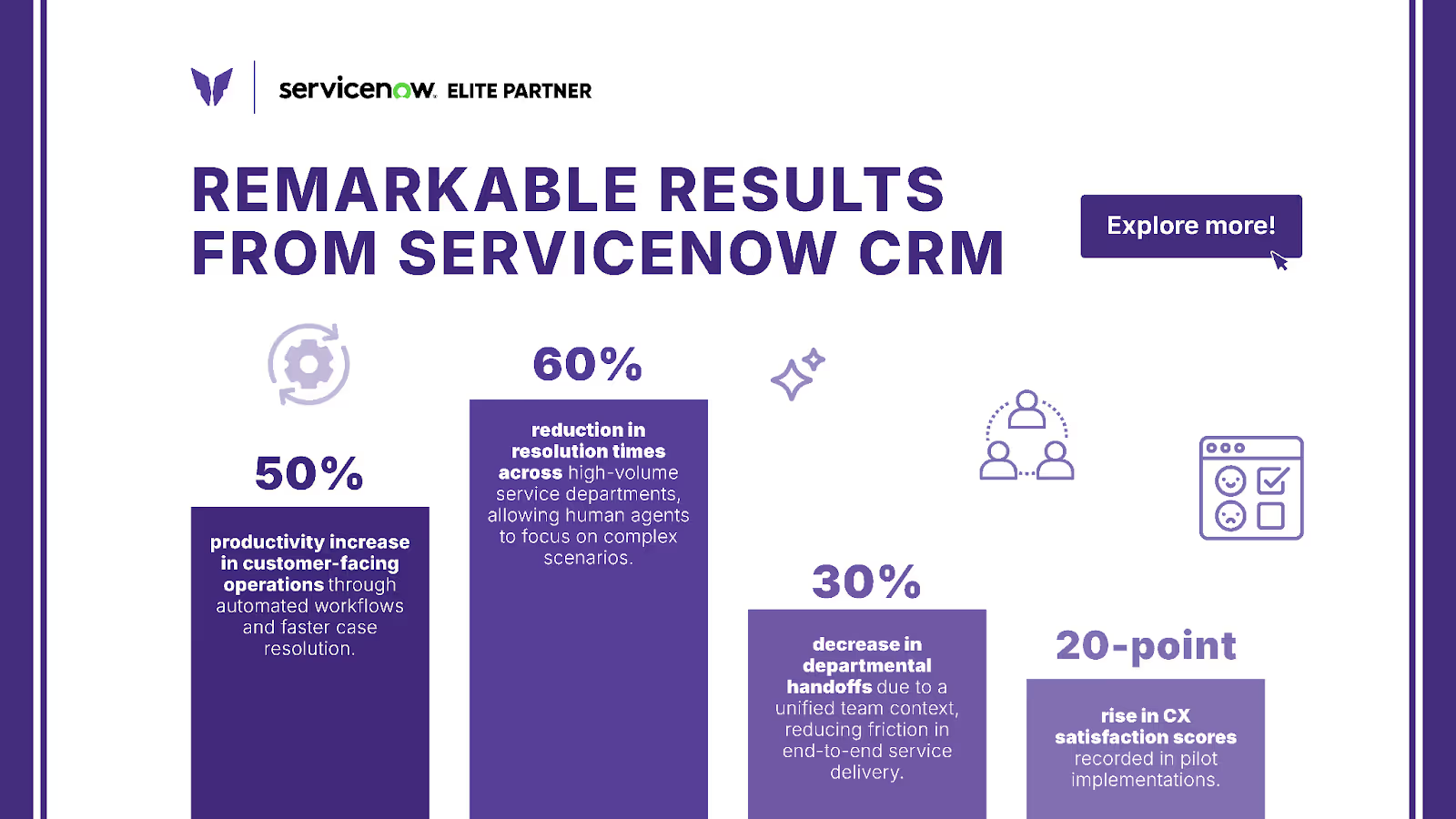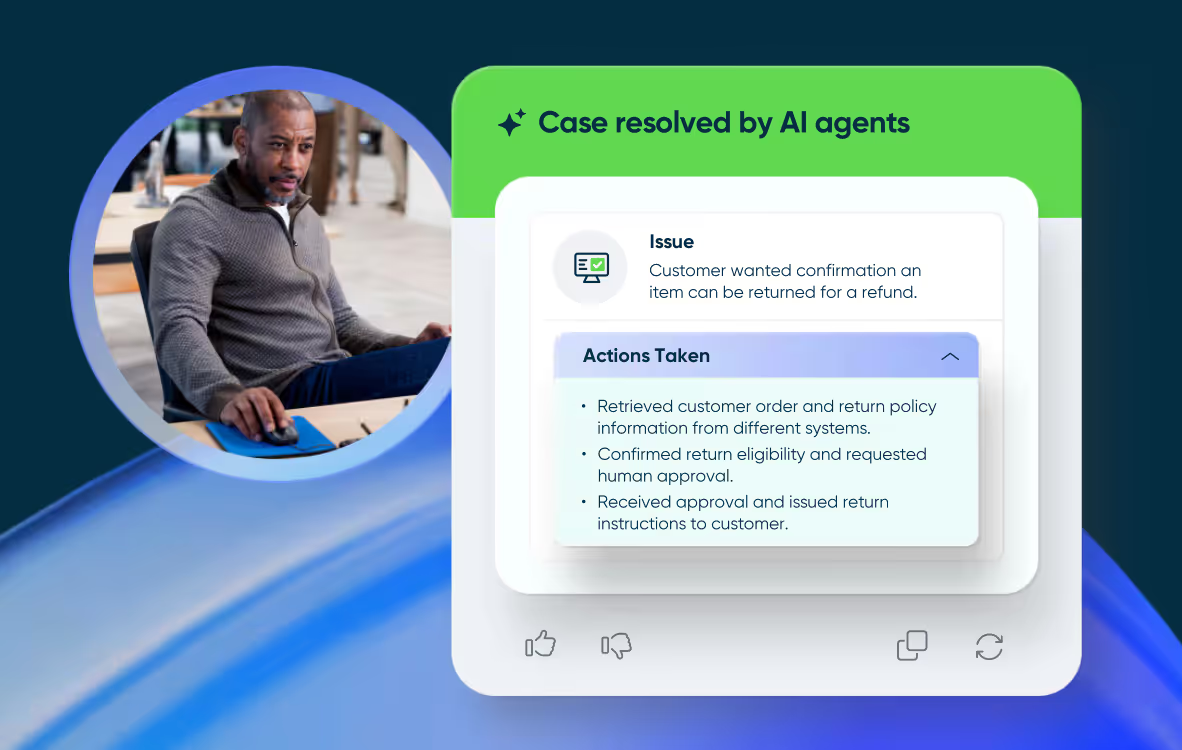From Zero Copy to the AI-first CRM Platform: Reinvention of ServiceNow CRM
“We’re building the platform for customer experience in the AI era.”
— ServiceNow Knowledge 2025
At the ServiceNow Knowledge 2025 event, the AI platform for business transformation officially launched a revolutionary new generation of CRM, reshaping the customer relationship management industry that has long been dominated by cumbersome and outdated systems. No longer just a traditional ITSM tool, ServiceNow is making a bold transformation to become the AI-first ServiceNow CRM — modern, seamless, and designed to serve customer experience in the AI era.

Returning from the event, Novabridge experts have praised ServiceNow's new technological advances: Zero Copy and Workflow Data Fabric. They predict these are foundational reforms that will help ServiceNow become the leading CRM platform.
Why traditional CRM needs a rebirth
Traditional CRM systems present a paradox: they promise a 360° view but in reality, data remains heavily fragmented.
According to McKinsey (2024), 30% of customer dissatisfaction stems from departments like sales, support, billing, and field ops not having synchronised data. In a context where users might contact you via app in the morning, phone at midday, and expect resolution by evening, information delays are no longer minor errors but barriers to trust.
Therefore, enterprises need a new CRM solution that doesn't just process faster but truly "understands" customers, according to proper context and behaviour.
From Zero-copy to Data Fabric: New Breakthrough in ServiceNow CRM
Zero-copy: Eliminating synchronisation challenges
The Zero-copy architecture feature in Workflow Data Fabric completely eliminates the need to copy data between systems, which causes delays, conflicts, and security risks in legacy CRM platforms.
Instead of copying from email, social media, and ERP systems, ServiceNow CRM accesses real-time data directly from original sources. This helps customer service teams resolve issues quickly and accurately, without being delayed by traditional processing pipelines.
More importantly, this design helps organisations strictly comply with security regulations such as the Australian Privacy Act and New Zealand Privacy Act, as access rights always closely follow original permissions, minimising the risk of "over-permission."
Workflow Data Fabric boosts operational efficiency and customer experience
Deeply integrated into the Now Platform, the Workflow Data Fabric architecture helps connect data from ERP, ITSM, and CRM into a unified flow. In the real world, customers don't care about internal processes. They only care about the final result: being supported quickly, at the right time, and with understanding.
At its core, Workflow Data Fabric is an intelligent data integration layer between existing systems, connecting dispersed data sources (both within and outside ServiceNow), analysing them, and orchestrating data seamlessly.
It's like an intelligent layer sitting between systems to:
- Connect real-time data
- Apply governance and security policies automatically
- Work as "one data layer"
ServiceNow Customer Relationship Management with Workflow Data Fabric, solves this equation by providing staff with a single interface where they can see the complete context: from support tickets and delivery status to chatbot interactions. Context becomes an advantage for support staff to respond flexibly, choosing appropriate attitudes and solutions that closely match customer emotions; and maintaining healthy customer relationship management.
According to Forrester, enterprises with well-connected customer data have 35% higher customer retention rates and process 25% faster — a competitive advantage that cannot be ignored.
ServiceNow CRM: Born to lead the AI era
We often tend to praise AI for its standout features like chatbots, intelligent predictions, and automatic knowledge generation. But the truth isn't quite so glamorous. "AI is only as powerful as the platform it's built into and the data it has access to," said Jon Sigler, senior vice president of Platform and AI at ServiceNow. In other words, whether AI is intelligent, robust, and works efficiently depends on its food — data — and the environment it's placed in. Enterprise AI projects often fail due to a lack of synchronised data, lack of context, and violations of access policies.
ServiceNow Customer Relationship Management addresses this weakness with three pillars:
- AI Agent Fabric, delivering proactive, context-aware responses across voice and digital channels;
- AI Control Tower, ensuring enterprise-grade governance over all AI-driven decisions;
- And critically, Zero Copy + Workflow Data Fabric, enables clean, secure, and real-time customer data that AI can trust.

An AI agent that can recognise a customer's churn risk whilst they're still chatting isn't magic but architectural design. Immediately, the AI assistant will automatically orchestrate and handle the situation within the limits it has been authorised. When it exceeds its capabilities, it will signal support specialists for handling along with real-time reports to help them quickly grasp the issue.
It is really turning enterprise data into actionable insights.
What Enterprises gain from the AI-first ServiceNow CRM Platform
According to ServiceNow’s 2025 press release on its new CRM platform, early enterprise adopters are already reporting substantial outcomes:
- Productivity boost of up to 50% in customer-facing operations by automating workflows and resolving cases faster.
- Resolution times were reduced by up to 60% across high-volume service departments, freeing up human agents to handle complex scenarios.
- 30% fewer handoffs between departments thanks to unified context across teams, decreasing friction in end-to-end service delivery.
- 37% faster for agents to get up to speed on a case
- Crucially, CX satisfaction scores rose by up to 20 points in pilot cases.

"With Workflow Data Fabric, we're making it easier for customers to connect, understand, and act on business data from any source so they can maximise efficiency and solve bigger, industry‑specific problems. ServiceNow is the AI platform for business transformation, delivering the winning combination of AI, data, and workflow orchestration and automation," Jon Sigler added.
For enterprise CIOs, this shift represents more than technology adoption. It's a re-architecture of how customer operations function. With automation and AI finally breaking out of siloed tools and into enterprise-wide orchestration, the opportunity is no longer incremental, it's systemic.
Ready to unlock the power of your data?
Speak to the Novabridge Team today to schedule a briefing session and discover how Workflow Data Fabric, Zero-copy and ServiceNow Customer Relationship Management can help your organisation gain deeper insights from data, automate workflows, and drive better business outcomes. Our team of ServiceNow experts will work with you to tailor a solution that meets your specific needs and empowers you to navigate the data-driven future with confidence.
Frequently Asked Questions
Q: What makes ServiceNow CRM different from traditional customer relationship management systems?
A: ServiceNow CRM leverages AI-first architecture with Zero-copy and Workflow Data Fabric technologies, eliminating data fragmentation that plagues traditional CRM systems. Unlike legacy platforms that promise 360° customer views but deliver fragmented data, ServiceNow customer relationship management provides real-time, unified customer context across all touchpoints.
Q: How does Zero-copy architecture benefit ServiceNow CRM implementation?
A: Zero Copy architecture in ServiceNow CRM eliminates the need to duplicate data between systems, reducing delays, conflicts, and security risks. This enables real-time access to original data sources from email, social media, and ERP systems, helping customer service teams resolve issues 60% faster while maintaining strict compliance with privacy regulations.
Q: Can ServiceNow customer relationship management integrate with existing business systems?
A: Yes, ServiceNow CRM seamlessly integrates with existing ERP, ITSM, and other business systems through Workflow Data Fabric. This intelligent integration layer connects dispersed data sources both within and outside ServiceNow, creating a unified data flow without requiring system replacement or complex data migration.
Q: What AI capabilities do ServiceNow CRM offer for customer service teams?
A: ServiceNow customer relationship management includes AI Agent Fabric for proactive, context-aware responses across all channels, and AI Control Tower for enterprise-grade governance. These AI agents can recognise customer churn risks in real-time, automatically orchestrate responses within authorised limits, and escalate complex issues to human specialists with complete context.
Q: What business outcomes can organisations expect from implementing ServiceNow CRM?
A: Early adopters of ServiceNow customer relationship management report significant improvements: up to 50% productivity boost in customer-facing operations, 60% reduction in resolution times, 30% fewer handoffs between departments, and 20-point increases in customer satisfaction scores. These outcomes demonstrate the platform's ability to transform customer operations systematically.


